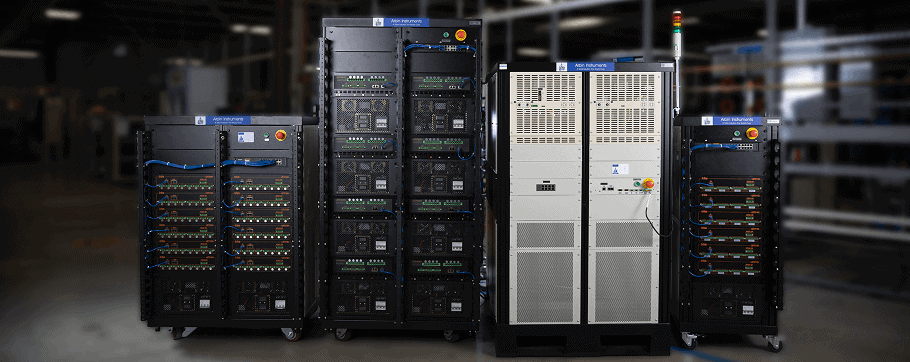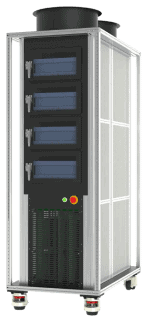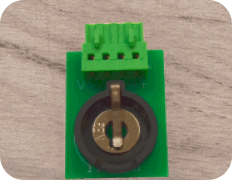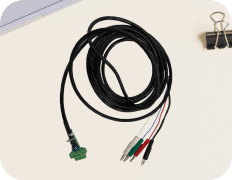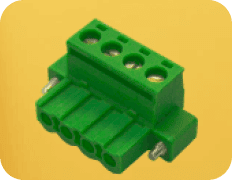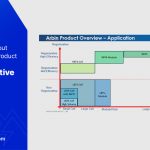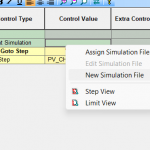Module/Pack Battery Testing
Module and pack battery formats are critical for electrification in the transportation and energy industries. Arbin Instruments’ module and pack test equipment is engineered to facilitate the performance-based tests that are critical to these complex battery formats. They are capable of addressing test needs including drive cycle simulations, dynamic stress tests, and BMS validation.


Warum sich Batterieforscher auf Arbin-Testgeräte verlassen
- Arbin's LBT und RBT Batterietestsysteme bieten modernste Batterietestleistung.
- Arbin offers battery test solutions starting from small benchtop models, up to Gigafactory-scale testing with remote management & control, and network database solutions.
- Die Arbin MITS-Testsoftware-Suite ermöglicht es Kunden, von der Materialforschung im Labor bis hin zu industriellen Batterietestanwendungen und der Produktion auf einer einzigen Plattform zu wachsen.
- Alle Batterietestgeräte von Arbin sind sicher und robust und verfügen über mehrere Sicherheitsschichten und spezielle Mikrocontroller für jedes Kanalmodul.
- Zur Erweiterung und Vervollständigung jedes Zelltestlabors sind umfangreiche Optionen und Zubehör erhältlich.
Regenerative Battery Testing
- Arbin’s Regenerative Battery Testing (RBT) series is specifically designed for testing high-power battery packs. Engineered with electric vehicles, military technology, and stationary grid storage in mind, these pack testing systems can simulate complex, real-world applications such as drive profiles, cranking amp applications, and other custom profiles. The regenerative circuitry within each RBT system allows power to be discharged back to the grid, making it a more economical battery test solution for pack voltage up to 1000V and maximum power up to 1MW.
| Spannung | 60~1,500V |
| Aktuell | 100~1,500A |
| Regenerativer Wirkungsgrad | >90% |
|

Solutions for Battery Module and Pack Testing Applications
Arbin Instruments’ module/pack test equipment include systems for the following applications:
- Lebenszyklustests
- Electric Vehicle (EV) Drive Cycle Simulations
- Hybrid Pulse Power Characterization Tests (HPPC)
- Dynamic Stress Tests (DST)
- Worldwide Harmonized Light Vehicles Procedure (WLTP0)
- Cranking Amp Tests
- Research and Development of Battery Packs for Electric Vehicle und Grid Storage Applications
- Validation of Internal Battery Management Systems (BMS) via CAN Bus
Regenerative Battery Test Equipment for Advanced Simulations
Arbin's RBT series of battery test equipment is capable of advanced, high-speed simulations. Users can upload pre-defined data or control the simulation dynamically via CAN communication.
Key Features:
- Profile Types: Time vs. Current, Time vs. Power, Time vs. Load
- Up to 1 million data points
- True Bipolar Circuitry so no switching between charge and discharge
- Data Acquisition Range: Up to 5ms
Compared to traditional battery cycling that may use exclusively constant current and constant voltage (CC-CV) charge/discharge profiles, EV testing applications require charge/discharge based on various real-world applications. These charge/discharge profiles are highly dynamic and require much greater current demands relative to “traditional” testing.


CANBus Communication and Regenerative Battery Testing
Arbin's RBT is the only tester that allows dynamic control of charge and discharge via the CAN protocol. This functionality allows users to control the Arbin tester with a Battery Management System (BMS).
CANBus Features of the RBT Series:
- Allows BMS to fully control RBT charge/discharge
- Easily import CAN database and customize
- Read/write integration with battery management system
- Offers easy-to-navigate drop-down menu selections
- Create customized CAN reports to compare BMS data
- No 3rd-party equipment, DLL package, or license is needed
- Extended or Standard Frame Type
Hilfsmittel und optionales Zubehör zur Verbesserung der Prüfung verfügbar
CANBus
Arbin bietet CANBus-Schnittstelle(n) um eine externe Steuerung des Arbin-Testers in Echtzeit über das CAN-Protokoll zu ermöglichen. Diese Funktion ermöglicht die Kommunikation von Batteriemodulen/Packs mit einem BMS (Batteriemanagementsystem) oder für Zellentests, bei denen der Kunde eine externe Steuerung über CAN benötigt.
MTCI
Die Temperaturkammer-Schnittstelle (MTCI) ermöglicht es dem Arbin-System, mit einer zugelassenen Temperatur-/Umgebungskammer eines Drittanbieters zu kommunizieren. Die Software von Arbin kann die Kammer ein- und ausschalten und die Temperatur während der Prüfung anpassen.
Control Power Supply
The Control Power Supply (CPS) provides multiple inputs that allow the Arbin test station to fully integrate with the facility, and allows the system to receive signals, display status with a safety tower light, and can be remotely shut down by the user.
Arbin bietet Thermoelement und Thermistor Sensortypen zur Messung und Aufzeichnung der Temperatur während der Prüfung. Sie funktionieren unabhängig voneinander, so dass der Benutzer sie flexibel in jeder beliebigen Konfiguration mit den Hauptkanälen für den Lade-/Entladetest zuordnen kann. Alle Daten werden automatisch mit den Daten der Lade-/Entladetests der Zellen synchronisiert. Folgende Sensortypen sind verfügbar:
- K-Typ Thermoelemente
- T-Typ Thermoelemente
- PT100 Thermistor (HINWEIS: PT100 Thermistoreingänge sind kompatibel mit Arbin MZTC Multi-Chamber.)
- 10kOhm Thermistor
Application-Based Battery Performance Testing with Arbin
Made for performance testing, Arbin’s module/pack battery test equipment allows engineers and scientists to assess battery behavior under specific real-world conditions. These systems are designed to test battery performance, condition, aging, and safety, along with BMS communication, under realistic scenarios that are simulated by drive cycle profiles and other application-specific tests. This data is critical to the development and production of pack and module batteries.

Kontaktieren Sie uns noch heute für ein Angebot
Füllen Sie unser Kontaktformular aus, um ein Angebot anzufordern oder zu erfahren, wie Batterietestgeräte von Arbin Instruments Ihre Prüfanforderungen erfüllen können.

